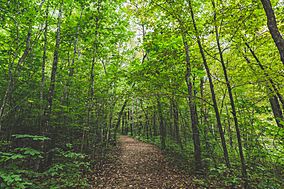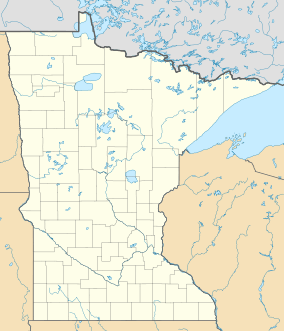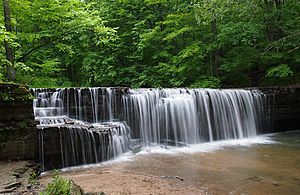Nerstrand-Big Woods State Park facts for kids
Quick facts for kids Nerstrand-Big Woods State Park |
|
|---|---|

Nerstrand-Big Woods State Park is a botanical reserve for the temperate hardwood forest that once covered much of central Minnesota
|
|
| Location | Rice County, Minnesota, United States |
| Area | 2,882 acres (11.66 km2) |
| Elevation | 1,086 ft (331 m) |
| Established | 1945 |
| Governing body | Minnesota Department of Natural Resources |
Nerstrand-Big Woods State Park is a beautiful state park in Minnesota, USA. It is located northeast of Faribault, near the small town of Nerstrand. The park gets its name from the "Big Woods." This was a huge forest that once covered much of southeast Minnesota.
The park's forest is like a smaller version of the original Big Woods. This larger forest was found west of the Cannon River. Besides a small waterfall, the most amazing part of this park is the forest itself. It's a special place to see what Minnesota looked like long ago.
Contents
Natural Wonders of the Park
The ground beneath Nerstrand-Big Woods State Park is made of Platteville Limestone. This rock formed almost 500 million years ago. You can see this limestone in a few spots along Prairie Creek. The most famous spot is at Hidden Falls.
Most of the park is covered by thick layers of glacial drift. This is material left behind by ancient glaciers. It can be up to 150 feet (46 m) deep! Long ago, meltwater from a glacier helped carve out the valley where Prairie Creek flows today.
Forests and Plants Through Time
This area was once covered by spruce forests. But as the climate got warmer after the last ice age, oak trees and prairie grasslands became common. About 400 to 500 years ago, the climate cooled a little. This change helped the Big Woods forest grow even more.
In the spring, many native wildflowers bloom here. They create a colorful carpet on the forest floor. The park is also home to a very rare plant. It's called the Minnesota dwarf trout lily. This tiny lily is endemic to this area, meaning it's found almost nowhere else in the world.
How the Park Came to Be
The town of Nerstrand was settled in the 1850s. Unlike many farming towns, these settlers were lucky to have a forest nearby. People divided the forest into small sections called woodlots. Each woodlot was usually about 10 or 20 acres (4 or 8 ha) in size.
Early Uses of the Woods
Owners managed their woodlots for their own needs. Many barns and some houses in the area were built with wood from old oak trees here. Some parts were cleared for farming or grazing animals. But many lots were kept as a source of firewood.
This mix of uses helped native animals and plants survive. When one area changed, they could move to another. This is why the park's habitat is so healthy today.
Protecting the Forest
In the 1930s, large logging companies wanted to buy the land. They wanted to cut down the trees. But the land was owned by 169 different people! Many of them didn't even live in Minnesota anymore. It was too hard to buy enough land for logging, so the companies gave up.
Local people asked Minnesota officials to make Nerstrand Woods a state park in 1934. But buying the land was still difficult because of all the different owners. Bills to create the park failed.
Becoming a State Park
In 1938, a new federal law helped. It allowed the United States Forest Service (USFS) to buy land here. Then, they could trade it for state-owned land in Superior National Forest. By 1944, the USFS owned 460 acres (190 ha). The next year, a bill officially made Nerstrand Woods a state park.
A special rule in the law allowed the University of Minnesota to do forestry experiments in some park areas. The Minnesota Department of Natural Resources (DNR) bought more woodlots over the years. This expanded the park to about two square miles.
Park Development and Name Change
Trails and a picnic area were built first. A campground was added in the 1960s. In 1992, the park's name changed to Nerstrand Big Woods State Park. This was to highlight the important forest it protects. The park continues to grow as more land is added.
Fun Things to Do at the Park
Nerstrand-Big Woods State Park has many things for visitors to enjoy. You can find places for individual and group camping. There are also picnic areas and a playground. The park has a large network of hiking trails for exploring the forest.
This park is special because it doesn't have a big lake for swimming or boating. It also doesn't have a major historical building. But its quiet beauty and amazing forest make it unique. The park is not usually crowded. You can often find empty campsites, except on busy holidays like Memorial Day and Labor Day.
Winter Activities
In the winter, the southern part of the park is open for snowmobiles. The northern part is kept quiet for cross-country skiing. It's a great place to enjoy the snowy landscape.
- Minnesota Department of Natural Resources. Nerstrand-Big Woods State Park signage, brochures, and website




